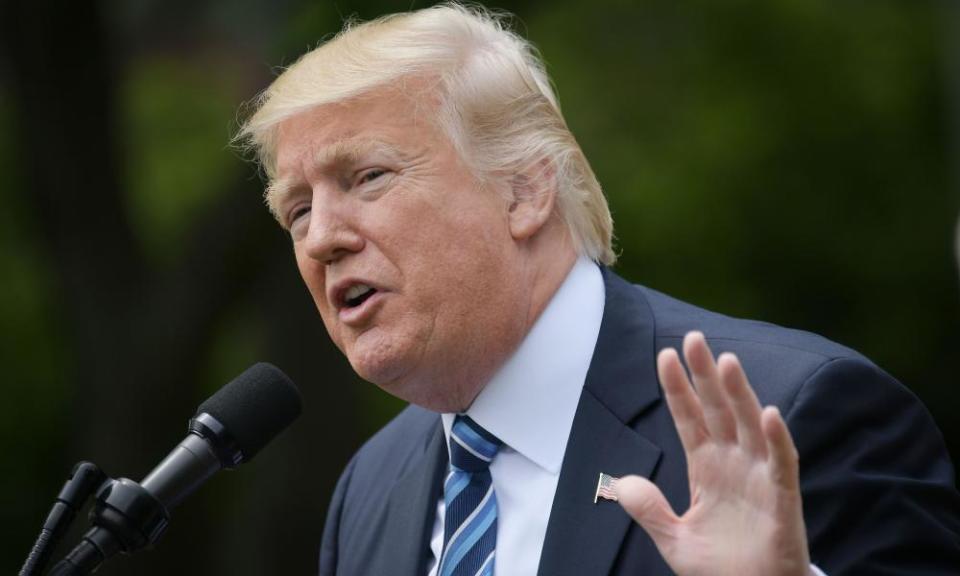Trump's remarks about Muslims could be what ends the travel ban, testimony suggests
Federal appeals judges cites comments Trump made on the campaign trail in which he promised a ‘total and complete shutdown’ of Muslims entering the US

Testy exchanges between judges and lawyers over Donald Trump’s travel ban on Monday indicated that the legality of the president’s executive order could be determined by his prior comments about Muslims.
The pointed questioning came during an appeals court hearing about an executive order Trump issued in March that attempted to halt new visas from six Muslim-majority countries and suspend refugee resettlement in the US. The first order in January was chaotically implemented and blocked by federal courts. The revised order was also blocked by courts in Maryland and Hawaii after judges found grounds for constitutional violations.
The Trump administration then appealed these rulings and on Monday faced the next stage in its legal battle during a hearing in front of 13 judges at the fourth circuit of appeals in Virginia.
Almost immediately, judges questioned the acting US solicitor general, Jeffrey Wall, about past statements made by Trump on the campaign trail during the presidential election in which he promised a “total and complete shutdown” of Muslims entering the US.
The comments made by Trump and other remarks about the order that were later made by those in his administration were cited by judges in Maryland and Hawaii as evidence of the order’s animus towards Muslims when the order was blocked in March.
“This is not a Muslim ban. Its text doesn’t have to anything to do with religion,” Wall argued on Monday as a number of judges peppered him with questions.
Judge Henry Floyd, a Democratic appointee, asked Wall if there was “anything other than willful blindness” that could prevent the court from interpreting Trump’s prior remarks in connection with the revised order. Judge Robert King, also a Democratic appointee, later added: “He has never repudiated what he said about the Muslim ban. It’s still on his website.”
Just minutes before the hearing began, the pledge appeared to have been removed from Trump’s campaign website, where it had been since December 2015.
There was, however, no ruling made by the court on Monday, and experts have suggested that a decision may take a significant amount of time as the en banc hearing (held before a full bench of judges) will probably mean longer deliberations. Such hearings are extremely rare at the initial stages of proceedings and underline the significance of the case.
Two judges, both appointed by Republican presidents, had recused themselves from Monday’s hearing. Judge J Harvie Wilkinson III recused himself, as Wall is his son-in-law. It was unclear why Judge Allyson Duncan had recused.
Highlighting the unpredictable nature of the case, Omar Jadwat, an attorney with the American Civil Liberties Union (ACLU), was also subjected to sharp questioning by judges. The ACLU, the National Immigration Law Center and the International Refugee Assistance Project (Irap) brought the case against the government in Maryland in March.
Judge Paul Niemeyer, a Republican appointee, appeared to suggest that ruling against the president, who commands large authority over immigration procedure, could be judicial overreach.
“I don’t know where it ends,” Niemeyer said in the hearing. “It seems to me we have to function in our three branches, and give respect to other branches.”
Judge Dennis Shedd, also a Republican appointee, asked Jadwat whether he believed Trump’s order would no longer be unconstitutional if, hypothetically, Trump apologised for his remarks on the campaign trail.
“What if he said he [Trump] was sorry every day for a year?” Shedd asked.
“It’s possible that saying sorry is not enough. That’s true in a lot of situations, your honour,” Jadwat replied.
Although the fourth circuit has traditionally been a more conservative court, it has become more moderate in recent years after a series of Barack Obama-era appointments.
The Maryland injunction against Trump’s revised order applies only to the section preventing visa applications from the six-Muslim majority countries. The Hawaii order is broader and also applies to the attempt to halt refugee resettlement. Arguments in the Hawaii case will be heard by a panel of three federal appeals court judges at the ninth circuit next week.
During Monday’s hearing, Wall, the acting solicitor general, told the court that the broader ruling in Hawaii had prevented the state department and the homeland security department from conducting further reviews of immigration vetting that the temporary stay on visas had been designed to bring about.
“Since 16 March, we have complied with the Hawaii injunction and done nothing,” Wall said.

